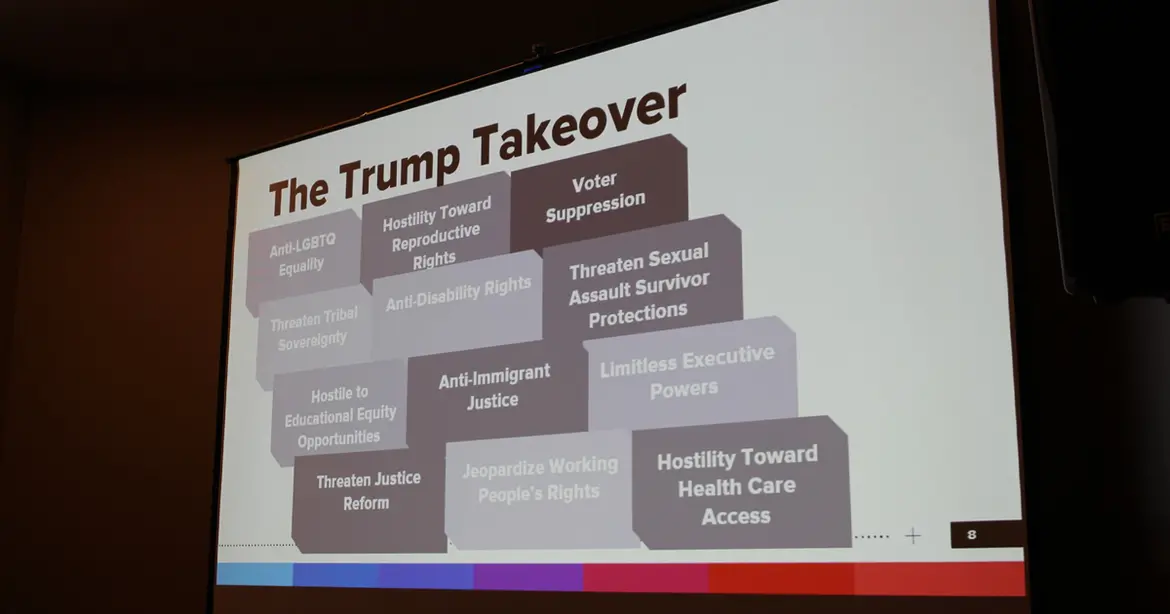In early December, PFAW Senior Director of Outreach and Public Engagement Diallo Brooks spoke on two conference panels to discuss possible solutions to pressing issues that have plagued our country for years: legislative action on gun violence and the impact of Donald Trump’s takeover of our federal courts by way of numerous appointments of extreme right-wing judges.
On December 4, Brooks joined speakers Bishop Mark Beckwith (Bishops United Against Gun Violence), Maya Castillo (New Virginia Majority), Joshua Harris-Till (Young Democrats of America) and Mallory Long (National Democratic Redistricting Committee) and moderator Stasha Rhodes (The Hub Project) at the 5th Annual Meeting on Gun Violence Prevention to discuss the rise of gun violence and the right’s current efforts to combat legislation on gun violence prevention.
Participants on the panel, titled “Intersection of Gun Violence Prevention and Democracy Reform,” spoke out about flaws in our democracy like voter suppression and explained how such issues affect gun violence and gun violence prevention. Brooks stated:
“Voter ID is a big voter suppression tactic because we know the communities that it hits; it hits women, it hits communities of color, it hits the LGBTQ community very hard and so it eliminates or lessens the voice of those populations, that are populations that would traditionally be populations that would push back against some of the Draconian guns laws that we have in this country… the NRA [National Rifle Association] and ALEC [American Legislative Exchange Council] are staunch against that.”
Brooks further pointed out that the NRA’s position in fighting against common-sense gun safety measures isn’t proportional to the number of people who would like to see such measures, calling it “very undermining to our democracy as a whole.”

Two days later, on December 6, Diallo Brooks took part in a panel on the fight for fair courts at the Leadership Conference’s We Are Democracy 2019 Annual Conference. The panel, titled “Protect Our Rights, Fight for Fair Courts,” focused on the impact of Trump’s takeover of the courts and the issues that newly appointed federal judges will be making rulings on, from voting rights to justice for immigrants. Other panelists included Sharon McGowan (Lambda Legal), Hilary Shelton (NAACP Washington Bureau), Joel West Williams (Native American Rights Fund), and Lena Zwarensteyn (Leadership Conference on Civil and Human Rights).
Confirmed judges are given lifetime appointments, so the decisions about judicial nominations made by one administration last well beyond the length of a single presidential or congressional term. As Brooks pointed out, “[The] 172 judges appointed by this president are impacting dramatically people’s lives every single day, and we have to tell them that, and we have to do a better job at telling them that.” Key to protecting democracy is taking seriously the judicial branch of government and holding accountable those who played a role in the confirmation of Trump’s judicial nominees.
Brooks says, “The thing is, we have to ask not only our candidates, but also ask the general population ‘Do you know that Senator X has voted this way to undermine your rights on civil rights? Do you know that Senator X has voted the wrong way to appoint judges to the court that have undermined worker’s rights? Do you know that Judge X has been nominated to the court and confirmed by your senator to undermine your rights as a woman, as LGBTQ, as African American, as an immigrant? We have to drive home that part of the conversation. It has to be a grassroots effort.”
